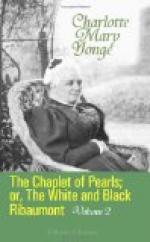Next, Sirs, did he marry?
And whom, Sirs, did he marry? One like himself,
Though doubtless graced with many virtues, young,
And erring, and in nothing more astray
Than in this marriage.—TAYLOR, EDWIN THE
FAIR.
Nothing could be kinder than the Ambassador’s family, and Philip found himself at once at home there, at least in his brother’s room, which was all the world to him. fortunately, Ambroise Pare, the most skillful surgeon of his day, had stolen a day from his attendance of King Charles, at St. Germain, to visit his Paris patients, and, though unwilling to add to the list of cases, when he heard from Walsingham’s secretary who the suffer was, and when injured, he came at once to afford his aid.
He found, however, that there was little scope for present treatment, he could only set his chief assistant to watch the patient and to inform him when the crisis should be nearer; but remarking the uneasy, anxious expression in Berenger’s eyes, he desired to know whether any care on his mind might be interfering with his recovery. A Huguenot, and perfectly trustworthy, he was one who Walsingham knew might safely hear the whole, and after hearing all, he at once returned to his patient, and leaning over him, said, ’Vex not yourself, sir; your illness is probably serving you better than health could do.’
Sir Francis thought this quite probable, since Charles was so unwell and so beset with his mother’s creatures that no open audience could be obtained from him, and Pare, who always had access to him, might act when no one else could reach him. Meantime the Ambassador rejoiced to hear of the instinctive caution that had made Berenger silence Philip on the object of the journey to Paris, since if the hostile family guessed at the residence of the poor infant, they would have full opportunity for obliterating all the scanty traces of her. Poor persecuted little thing! the uncertain hope of her existence seemed really the only thread that still bound Berenger to life. He had spent eighteen months in hope deferred, and constant bodily pain; and when the frightful disappointment met him at La Sablerie, it was not wonder that his heart and hope seemed buried in the black scorched ruins where all he cared for had perished. He was scarcely nineteen, but the life before him seemed full of nothing but one ghastly recollection, and, as he said in the short sad little letter which he wrote to his grandfather from his bed, he only desired to live long enough to save Eustacie’s child from being a nameless orphan maintained for charity in a convent, and to see her safe in Aunt Cecily’s care; and then he should be content to have done with this world for ever.
The thought that no one except himself could save the child, seemed to give him the resolution to battle for life that often bears the patient through illness, though now he as suffering more severely and consciously than ever he had done before; and Lady Walsingham often gave up hopes of him. He was tenderly cared for by her and her women; but Philip was the most constant nurse, and his unfailing assiduity and readiness amazed the household, who had begun by thinking him ungainly, loutish, and fit for nothing but country sports.




